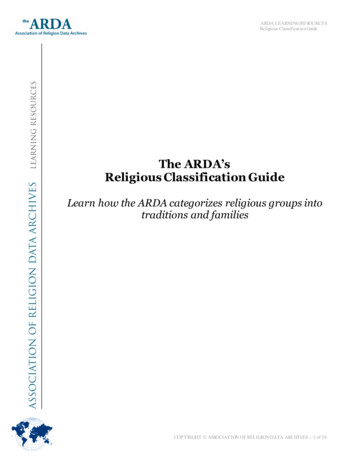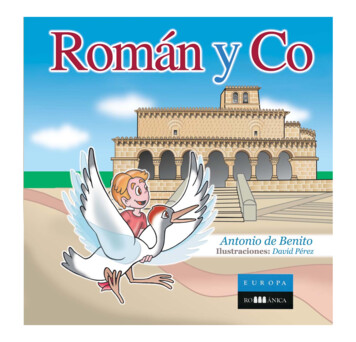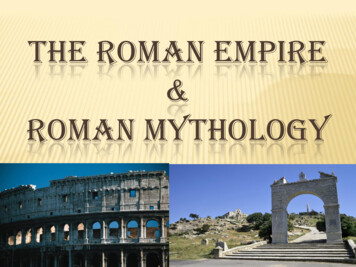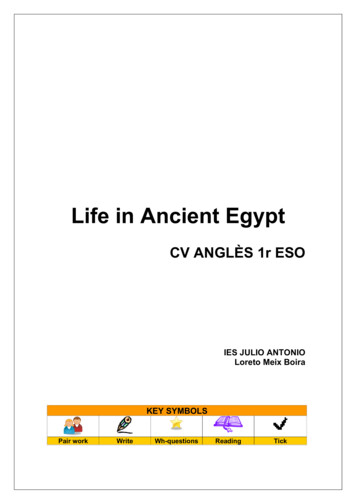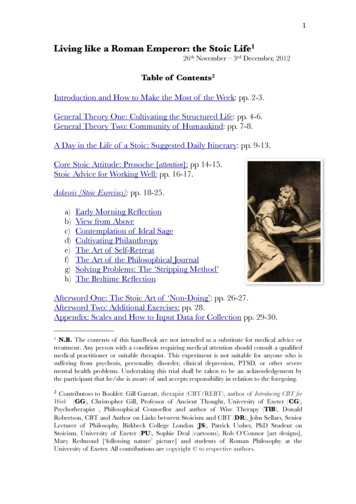
Transcription
1Living like a Roman Emperor: the Stoic Life126th November – 3rd December, 2012Table of Contents2"Introduction and How to Make the Most of the Week: pp. 2-3.General Theory One: Cultivating the Structured Life: pp. 4-6.General Theory Two: Community of Humankind: pp. 7-8.A Day in the Life of a Stoic: Suggested Daily Itinerary: pp. 9-13.Core Stoic Attitude: Prosoche [attention]: pp 14-15.Stoic Advice for Working Well: pp. 16-17.Askeseis [Stoic Exercises]: pp. 18-25.a)b)c)d)e)f)g)h)Early Morning ReflectionView from AboveContemplation of Ideal SageCultivating PhilanthropyThe Art of Self-RetreatThe Art of the Philosophical JournalSolving Problems: The ‘Stripping Method’The Bedtime ReflectionAfterword One: The Stoic Art of ‘Non-Doing’: pp. 26-27.Afterword Two: Additional Exercises: pp. 28.Appendix: Scales and How to Input Data for Collection pp. 29-30.N.B. The contents of this handbook are not intended as a substitute for medical advice ortreatment. Any person with a condition requiring medical attention should consult a qualifiedmedical practitioner or suitable therapist. This experiment is not suitable for anyone who issuffering from psychosis, personality disorder, clinical depression, PTSD, or other severemental health problems. Undertaking this trial shall be taken to be an acknowledgement bythe participant that he/she is aware of and accepts responsibility in relation to the foregoing.12 " Contributorsto Booklet: Gill Garratt, therapist (CBT/REBT), author of Introducing CBT forWork (GG), Christopher Gill, Professor of Ancient Thought, University of Exeter (CG),Psychotherapist , Philosophical Counsellor and author of Wise Therapy (TlB), DonaldRobertson, CBT and Author on Links between Stoicism and CBT (DR), John Sellars, SeniorLecturer of Philosophy, Birkbeck College London (JS), Patrick Ussher, PhD Student onStoicism, University of Exeter (PU), Sophie Deal (cartoons), Rob O’Connor [art designs],Mary Redmond [‘following nature’ picture] and students of Roman Philosophy at theUniversity of Exeter. All contributions are copyright to respective authors.
2Introduction: Making the Most of the ‘Living like a Stoic’ExperimentTlBWelcome to this opportunity to take part in a unique experiment, to follow the twomillennia old Stoic Philosophy as a Way of Life in the modern-day! This project stemsfrom a recent workshop, between academics and psychotherapists, at the University ofExeter (U.K.) held in October 2012, the goal of which was to explore possibleadaptations of Stoicism for the modern-day. This Stoic week is part of that project, aweek which you are invited to join.In this booklet, you will find guidance on how to adapt and follow Stoic principles,with a combination of general theory and more specific, step-by-step guidance oncertain Stoic exercises. Take your time to familiarize yourself with the general theory,and reflect on how this could relate to the next week. Then look more closely at thesections on prosoche, working well, the daily itinerary, specific exercises, and reflect onhow you can implement these in your normal day to day activities. Throughout thebooklet, you will find prompts here and there (always beginning with ‘pre-weekreflection’) to help you reflect on the implications of each section for your own life.These materials have been prepared by experts in the field and give you an unusual,and free, chance for personal development. You may be full of excitement about thisprospect and be 100% confident that you will make full use of this opportunitywithout further guidance. If that is the case, then there is no need to read any more ofthis section. If, however, you are human and not yet a fully developed Stoic sage, youmay have some doubts, either about the potential benefits of doing the work or ofyour ability to follow it through. If that is the case, then read on for an FAQ which youmight find helpful:Q: How do I know that living like a Stoic will benefit me?A: You don't. Indeed, one of the reasons we are conducting the experiment is to findout whether, and how, Stoic practices can help us to live better. All we can say is thatsome people have found some of the exercises and readings worthwhile. The benefitfor you may be educational - in understanding what Stoicism is about - it may bepsychological - helping you become more resilient and possible even happier - it maybe moral - you may find that the week helps you develop certain desirable ethicalqualities. Or you may find that Stoicism is one philosophy that isn't for you, whichmight in itself be a valuable thing to learn.Q: I'm worried I may not have time to do everything. How can I givemyself the best chance of making the most of it?A: It will probably be helpful for you to think of this as a definite, short -termcommitment - similar perhaps to the effort you would put in to rehearsing the weekbefore appearing in a play, or an exam, or training for a sporting event. As with thosecommitments, it's essential for you to make time for the additional activities. For
3example, you might like to set aside half an hour at the beginning and end of eachday specifically for Stoicism this week.One advantage you have over the ancient Stoics is that you can use moderntechnology. How many ways can you think of in which modern technology could helpyou live like a Stoic. Here are some ideas:* Record a video diary of your experiences of living like a Stoic - then, if you want,post it to YouTube or the Stoic blog* Record your experiences on Facebook* Tweet about your experiences, or tweet Stoic adages as you go along.* Each day summarise what you have learnt as a tweet* Use your phone a reminder to start your Stoic practicesWhich of these appeal to you? How many other ways can you use technology to helpyou live like a Stoic? If you are doing the experiment with other people, it might helpto discuss your experiences each day. Perhaps you could have a 10 minute Stoic coffeeeach day where you touch base with how you are doing. If you are not geographicallyclose to other participants, you might use the Stoic blog to connect with others, andindeed there will be opportunities to post on the blog daily about how the week isgoing and to post any general reflections, or quotations from Stoicism which youparticularly find useful.Q: How will I know whether it has helped or not?A: You will have the opportunity to fill in questionnaires before and after the weekwhich will help you see objective measures of change and also allow you to reflect onthe experience. Your doing so will also help us to evaluate the benefits and limitationsof Stoic practices. In Stoic terms, you could say participation in the experiment can beseen as part of living a good life.N.B. All who follow this trial are warmly encouraged to submit theirresults (see Appendix for how to do this). This data will be analyzed by ateam of psychotherapists. All those who complete all surveys will beautomatically entered into prize draw for a signed copy of Jules Evans’Philosophy for Life and other Dangerous Situations. You are, in addition,encouraged to post how the week is going on the blog, and any reflectionsyou would like to share [http://blogs.exeter.ac.uk/stoicismtoday/].
4General Theory One: Cultivating a Structured LifeCGI think one very valuable thing that Stoicism can offer is the idea that we can give ourlives structure or coherence. More precisely, we can all give our lives structure orcoherence (not just special people) – and we can do this in spite of all the problemsand setbacks that seem to threaten any coherence our lives might otherwise have.One way of defining the Stoic idea of a structured life is as an ongoing projector journey towards an ideal that can form a definite target or goal for our aspirationseven though it is hard or even impossible to reach it fully. The project can beexplained as a combination of the two kinds of ethical development that Stoicismthinks we are all fundamentally capable of carrying through.One kind of development consists in the way we understand our ownobjectives or goals. A crucial aspect of this is recognising that what matters –ultimately – is not just obtaining things that it is natural for all of us to want, such ashealth, material goods, a partner or family or circle of good friends. What matters,above all, is the way we set about trying to obtain those things, or selecting some thingsrather than others, or selecting some things and rejecting others. What matters iswhether we carry out this process in a way that, increasingly, expresses the qualitiesthat are fundamental to any good human life – the virtues, as Stoics put it – and whichalso expresses the kind of rationality that is a central part of a good human life.Making progress on our project consists in gaining an ever clearer understanding ofwhat it means to obtain things in this way and to embed this understanding in ourwhole pattern of motivation, action and relationships. As Stoics put it, it meanscoming to recognise that ‘virtue is the only good’, the only thing that is worth aimingat for its own sake. Although this can seem a very abstract and remote goal, it is onethat, I believe, we can all make some sense of, especially if we ask ourselves in anygiven occasion what we are trying to achieve – above all.Key Idea: Do we want – above all or at all costs – to get this job, this prize, this girlfriend orboyfriend, or rather to do so in a way that matches, and helps to fulfil, our deepest ideals andaspirations?
5A second kind of development consists in the way we relate to other people.Stoics believe human beings (and other animals too) are naturally inclined to want tobenefit others of our kind. But human beings, unlike other animals, are capable ofwidening the scope of those we regard as being ‘of our kind’ and whom we want tobenefit – extending, in principle to any given human being whose life we can affect.Other sections of this booklet (by Donald Robertson) have very useful things to sayabout this process of extension and how we can put it into practice. This second kindof development needs to be taken closely with the first, especially if we are aiming togive our lives coherence and structure. If we want to benefit or help other people, weneed to think carefully about what it really means to ‘benefit’ them, and keep in mindthe understanding of priorities and values that is crucial for the first kind ofdevelopment. ‘Benefiting’ other people, for instance, may not mean providing themwith material goods or practical help (though there will be times when this is the rightthing for us to do). In some cases, it may be a matter of helping them move towardsliving a life that matches their deepest aspirations too – in Stoic terms, to recognisethat virtue is the only good – and to help them to embed this recognition in the waythey live. At all events, it means that we should not forget about, or set aside, the firstkind of development in our eagerness to help other people, especially if this risks notreally ‘helping’ them very much at all.Key Idea: I think if we can take forward these two aspects of ethical development, or even begin todo so, we will in that way give our lives coherence and structure, and one that emerges from within ourmotives and hopes and is not imposed from outside.But maybe this does not sound much fun! Is there no room in this kind of lifefor parties or celebration? What if our birthday is coming up – do we have to ‘put thaton hold’ while we are trying to live like a Stoic? Surely not. Much of the point of theStoic approach is to shape or reshape how we live socially, rather than requiring us tolead a separate or monastic life. But what we might usefully do is to think about whatwe are celebrating and why, and who we want to celebrate this with, and also how wecan do this in a way that matches the answer we have given to the first two questions.In other words, we might want to mark our birthday in a way that expresses what wereally want, in a more than superficial way, to share with other people – and which isalso enjoyable. This may not quite match the stereotype of the ‘full-on’ student partybut may fit better into the overall shape we want to give to our lives.One very major advantage of the kind of structure provided by the Stoicethical project is that it helps to build up resilience against the setbacks – even disasters– that any of us can encounter at any time. Other kinds of structured life, based onmore external or socially defined standards, are more easily thrown off course byevents of this type. This does not mean that Stoics are necessarily cold or lacking innatural responses, as is sometimes supposed. For the Stoic theory of value, illness orinjury or death (your own or that of someone close to you) is something that you arenaturally inclined not to want to happen – it is not ‘preferable’, in their terminology.But these things are not the complete disasters that they sometimes seem from a moreconventional viewpoint.For one thing, we can see that these things are not the worst thing that canhappen in the world; the worst thing would be for the person concerned to become amorally repellent and corrupt individual, whether the person concerned is ‘me’ or
6someone close to me. (In fact, for Stoics, this is the only thing that is ‘bad’ in acomplete sense.) For another, a disaster, even the death of a close friend or relative,does not mean the end of the opportunity for us to lead a full and indeed happy life,even if at first it does feel like the end of this hope. It does not mean that we have togive up the Stoic project of carrying forward the two kinds of ethical developmentoutlined here and of working out how these are linked, in theory and in practice. Onthe contrary, one of the ways we can try to express the qualities that are fundamentalfor a good life (the ‘virtues’) is in confronting the fact that human lives are transientand fragile, while still giving full weight to the worth of the life that someone has lived.In that sense, the structure that a Stoic life can have is much more securely groundedthan some other types of deliberately chosen lives, although putting that structure inplace depends on some hard work on our part, in ways suggested in the course of thisbooklet.
7General Theory Two: The Community of HumankindDR [adapted and abridged]One of the most common criticisms of Stoicism is that it is an austere and emotionlessphilosophy, and therefore somehow inhuman. The popular idea of the ancient Stoicsis perhaps that they would like us all to be coldly rational, like a robot, or like thecharacter “Mister Spock” in Star Trek. However, what if this turned out to be nothingmore than a widespread misconception? What if overcoming our irrational andunhealthy passions entailed cultivating healthy and rational emotions in their stead?Indeed, what if Stoicism placed central importance on love, so much so that we mighteven approach it from that perspective, as providing in some respects a philosophy oflove?According to Diogenes Laertius, the early Stoics identified specific “good” or“healthy passions” (eupatheia), of a rational type, which are more transitory feelingsthat naturally “supervene on” or emerge from the virtues. The rational form of desire,called “willing” the good (boulêsis), or sometimes “well-wishing”, appears to havemainly encompassed friendly and loving feelings, such as: Benevolence or goodwill (eunoia)Kindness or graciousness (eumeneia or eumenês)Welcoming or acceptance (aspasmos)Love or affection itself (agapêsis)The Stoics perhaps meant that when we act with wisdom and justice toward others wenaturally come to feel a sense of goodwill toward them and to wish for them toflourish and become wise, thereby making of them our friends, Fate permitting (as it isnot within our direct control). The later Stoics have quite a bit to say about love andthese related healthy emotions. For example, Musonius said that humans are naturallysocial creatures and that the Stoic therefore excels insofar as he “displays love for hisfellow human beings, as well as goodness, justice, kindness, and concern for hisneighbour”. The Stoic sees virtue as true beauty and feels love toward others who arevirtuous, or insofar as they have the potential to be wise and good.Moreover, the Stoics were far from being “cold fish”, people who simplyignored or neglected the concept of love, for it’s even claimed by ancient sources thatZeno wrote a book entitled the Art of Sexual Love. According to Diogenes Laertius, theearly Stoics thought sexual love (erôs) should be seen as a way of developing mutualintimacy and friendship (Lives, 7.130). However, most of these passages about sexuallove were allegedly expunged from Zeno’s writings by a later Stoic calledAthenodorus, responsible for the Greek library at Pergamum, something that wassoon exposed leading to a scandal within Stoicism (Laertius, Lives, 7.34). Moreover,very little has been written by modern scholars about the concept of “love” inStoicism, with the notable exception of a scholarly article entitled “Epictetus on Howthe Stoic Sage Loves” by William O. Stephens (1996). As Stephens puts it, the centralproblem of love for Stoicism would be: “How does the Stoic love others withoutallowing his love to become an ‘unhealthy state of mind’?” (Stephens, 1996). To applythe criteria cited by the early Stoics: How can we prevent natural affection or lovefrom turning into a feeling that is irrational, excessive or unhealthy? How can we loveothers in a way that allows us to consistently flourish in terms of our natural potentialas rational beings and to enjoy Stoic serenity and a “smooth flow of life”? Although
8it’s not common to approach Stoicism from this perspective doing so perhaps helps toaddress some of the most important criticisms it has to face, by meeting them headon.Musonius said that through studying Stoicism, rather than becoming somehowunemotional, mothers may acquire a deeper and more philosophical love for theirown children: “Who, more than she, would love her children more than life?” Indeed,the Stoics were apparently one of the first major philosophical schools to encouragewomen to train as philosophers and Musonius famously argued that girls should studythe subject because the virtues of a philosopher are ideally suited to the role of a wifeand mother as well as to a husband and father (Nussbaum, 1994). As we shall, see thisnatural affection for oneself and one’s immediate family is cultivated and expanded byStoics into the more pervasive attitude called “philanthropy” or love of all mankind.However, this notion, that Stoicism teaches a more profound, expansive sense ofparental love and affection, definitely clashes with the popular misconception of Stoicsas emotionless robots, doesn’t it?If Stoicism seems overly “macho” or as if it neglects emotions, or if you findyourself defending Stoicism to people who think it’s cold-hearted, it can be useful toremember the central role that love plays in the Stoic philosophical system. Inparticular, the love and affection people naturally tend to have toward their ownchildren and close family (philostorgia) is taken as the basis for the philanthropicattitude Stoics aspire to cultivate toward all mankind. Stoics sought to emulate theattitude of Zeus the father of mankind, toward his children, and therefore to cultivatea kind of family affection, paternal or brotherly love toward every rational being,which they called “philanthropy”, love of mankind. The more love expands to includeall mankind, and ultimately Nature as a whole, the more rational and healthy itbecomes. However, before we can love wisely and in the manner that is truly naturalfor rational beings, we must also accept the inevitability of change and loss, and thatthis is outside of our direct control. Otherwise, we are likely to vacillate between overattachment and anger, as circumstances change.Can we approach Stoicism from this perspective, then, and see it as partly a“philosophy of love”, and as part of an attempt to understand the role of rational lovein the art of living wisely?
9The first words of Epictetus’ Handbook (Encheiridion) in GreekGuideline: A Day in the Life of a StoicDRIn this section, you can read a suggested framework for a Stoic day, a framework whichdraws primarily on the handbook of Epictetus. Some of the exercises described here willbe explored in further detail in the section dealing with askeseis.GeneralThe chief goal of Stoicism, from the time of its founder Zeno, was expressed as“follow nature”. Chrysippus distinguished between two senses implicit in this:following our own nature and following the Nature of the world. Hence, Epictetuslater expressed a general principle at the start of his famous Handbook, which thelatterday Stoic the Early of Shaftesbury called the “Sovereign” precept of Stoicism:Some things are under our control, while others are not under our control. Under our control areconception [the way we define things], intention [the voluntary impulse to act], desire [to get
10something], aversion [the desire to avoid something], and, in a word, everything that is our own doing;not under our control are our body, our property, reputation, position [or office] in society, and, in aword, everything that is not our own doing. (Enchiridion, 1)Those things that our under our control, essentially our own voluntary thoughts andactions, should be performed in harmony with our nature as rational beings, i.e., withwisdom and the other forms of excellence (arete). Those things outside of our directcontrol should be accepted as Fated by the “string of causes” that forms the universe,as if they were the Will of God, and indifferent with regard to the perfection of ourown nature, which contitutes human “happiness” or flourishing (eudaimonia). Followingnature in this way, according to the Stoics, is living wisely and leads to freedom(eleutheria), fearlessness (aphobia), overcoming irrational fear and desire (apatheia),absence of distress (ataraxia), serenity (euroia) and a “smooth flow of life”.Mornings1. Meditation1.1. Take time to calm your mind and gather your thoughts before preparing for theday ahead. Be still and turn your attention inward, withdraw into yourself, or isolateyourself from others and walk in silence in a pleasant and serene environment.1.2. The View from Above. Observe (or just imagine) the rising sun and the stars atdaybreak, and think of the whole cosmos and your place within it [see here for guideto view from above exercise].2. The Prospective Morning Meditation2.1. Mentally rehearse generic precepts, e.g., the “Sovereign” general precept ofStoicism: “Some things are under our control and others are not”.2.2. Mentally rehearse any potential challenges of the day ahead, and the specificprecepts required to cope wisely with them, perhaps making use of the previousevening’s self-analysis. When planning any activity, even something trivial like visitinga public bath, imagine beforehand the type of things that could go wrong or hinderyour plans and tell yourself: “I want to do such-and-such and at the same time to keepmy volition [prohairesis] in harmony with nature” (Enchiridion, 4). That way if youractions are later obstructed you can say: “Oh well, this was not all that I had willedbut also to keep my volition in harmony with nature and I cannot do so if I am upsetat what’s going on” (Enchiridion, 4). (In other words, plan to act with the “reserveclause” for you are not upset by things but by your judgement about what you desiredto achieve or avoid, and what is good or bad.)
112.2.1. Praemeditatio Malorum. Periodically contemplate apparent “catastrophes” such asillness, poverty, bereavement and especially your own death, rehearse facing suchcalamities “philosophically”, i.e., with rational composure, in order to overcome yourattachment to external things (Enchiridion, 21). Contemplate the uncertainty of thefuture and the value of enjoying the here and now. Remember you must die, i.e., thatas a mortal being each moment counts and the future is uncertain.3. Contemplation of the Sage3.1. Periodically contemplate the ideal of the Sage, try to put his philosophicalattitudes into a few plain words, what must he tell himself when faced with the sameadversities you must overcome? Memorise these precepts and try to apply themyourself. Adopt a role-model such as Socrates, or someone whose wisdom and othervirtues you admire. When you’re not sure how to handle some encounter, askyourself: “What would Socrates or Zeno have done in this situation?” (Enchiridion, 33)Throughout the Day1. Mindfulness of the Ruling Faculty (prosoche). Identify with your essentialnature as a rational being, and learn to prize wisdom and the other virtues as the chiefgood in life. Continually bring your attention back to your character, actions, andjudgements, in the here and now, during any given situation. When dealing withexternals, be like a passenger who has temporarily gone ashore on a boat trip, keepone eye on the boat at all times (on yourself, your character) and be prepared at anymoment to have to return onboard at the call of the captain, i.e., to abandonexternals and give your whole attention again to yourself, your own attitudes andactions (Enchiridion, 7). As if you were walking barefoot and cautious not to tread onsomething sharp, be mindful continually of your leading faculty (your intellect andvolition) and guard against it being harmed (corrupted) by your own foolish actions(Enchiridion, 38). All of your attention should focus on the care of your mind(Enchiridion, 41). In response to every situation in life, ask yourself what faculty orvirtue nature has given you to best deal with it, e.g., courage, restraint, etc., andcontinually seek opportunities to exercise these virtues (Enchiridion, 10).2. Indifference & Acceptance. View external things with indifference. Tellyourself: “For me every event is beneficial if I so wish, because it is within my power toderive benefit from every experience” (Enchiridion, 18). Serenely accept the givenmoment as if you had chosen your own destiny, “will your fate” after it has happened(Enchiridion, 8). Accept the hand which fate has dealt you.3. Evaluating Profit (lusiteles). Think of life as a series of transactions, sellingyour actions and judgements in return for experiences. What does it profit you to gainthe whole world if you lose yourself ? However, virtue is always profitable, because it isa reward enough in itself but also leads to many other good things, such as friendship.Accepting that your fate entails the occassional loss of external things is the price
12nature demands for your sanity (Enchiridion, 12). If the price you pay for externalthings is that you enslave yourself to them or to other people then be grateful that ifyou renounce them you have profited by saving your freedom, if upon that you put ahigher value (Enchiridion, 25).4. Cognitive Distancing. When you are upset, remind yourself that it is yourjudgement that upsets you and not, e.g., external events or the actions of others. Firstof all, then, try not to be swept along by the impression but delay responding to thesituation until you have had time to regain your composure and self-control(Enchiridion, 20). Likewise, when you have the automatic thought that something ispleasurable or desirable, be cautious that you don’t get carried away by appearances,but generally delay your response (Enchiridion, 34). Then contemplate together boththe experience of enjoying the pleasure and any negative consequences or feelings ofregret that are likely to follow; compare this to the image of yourself praising yourselffor abstaining from it (Enchiridion, 34).5. Empathic Understanding. When someone acts like your enemy, insults oropposes you, remember that he was only doing what seemed to him the right thing, hedidn’t know any better, and say: “It seemed so to him” (Enchiridion, 42). When youwitness someone apparently doing something badly, abandon your value judgementand stick with a description of the bare facts of his behaviour, because you cannotknow what he did was bad without knowing his judgements and intentions (Enchiridion,45).6. Physical Self-Control Training. Train yourself, in private without making ashow of it, to endure physical hardship and renounce unecessary desires, e.g., practicedrinking only water, or when thirsty holding water in your mouth for a moment andthen spitting it out without drinking it (Enchiridion, 47). Withdraw your aversion (ordesire to avoid) from things not under your control and focus it instead on what isagainst your own nature (or unhealthy) among your own voluntary judgements andactions (Enchiridion, 2). Likewise, abandon desire for things outside of your control.However, Epictetus also advises students of Stoicism to temporarily suspend desirefor the good things under their control, until they have a firmer grasp of thesethings (Enchiridion, 2). Engage in physical exercise, particularly to develop yourpsychological endurance and self-discipline rather than your body.7. Impermanence & Acceptance. Contemplate the transience of material things,how things are made and then destroyed over time, and the temporary nature ofpleasure, pain, and reputation. View external things as gifts on loan from the gods andrather than say “I have lost it” say “I have given it back” (Enchiridion, 11). Think ofthe essence of things, and what they really are.8. Act with the “Reserve Clause”. At first, rather than being guided by yourfeelings for or against things (desire or aversion), use judgement to guide yourvoluntary actions (or “impulses”) toward and away from things, but do so lightly andwithout straining and with the “reserve clause”, i.e., adding “Fate permitting” to every
13intention to act upon externals (Enchiridion, 2).9. Natural Af
A Day in the Life of a Stoic: Suggested Daily Itinerary: pp. 9-13. Core Stoic Attitude: Prosoche [attention]: pp 14-15. Stoic Advice for Working Well: pp. 16-17. Askeseis [Stoic Exercises]: pp. 18-25. a) Early Morning Reflection b) View from Above c) Contemplation of Ideal Sage d) Cultivating Philanthropy e) The Art of Self-Retreat

